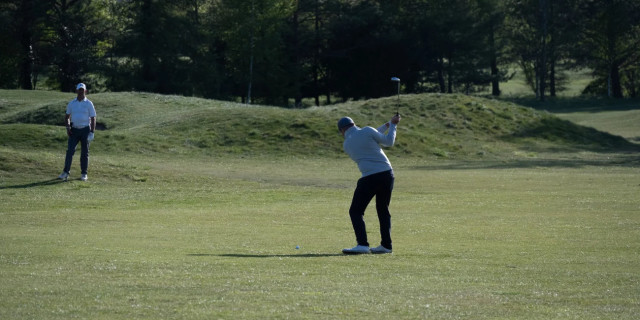You will not be surprised to learn that the subject of slow play once again dominated your thoughts in our latest membership survey. It was ever thus.
As somebody who recently had to endure a five-hour 20-minute round in a fourball stableford competition, trust me when I tell you that this is something that has exercised my thoughts and those of many of my fellow golfers. I understand that not everybody wants to complete 18 holes in under four hours, but many of us do!
And standing around waiting on every single shot is extremely challenging, especially in cold and wet weather. It seems that waving people through has become a thing of the past.
There is clearly a difficult balancing act to be performed around pace of play but I am certain nobody would consider five hours and 20 minutes to be acceptable.
I am a member of a parkland course and that means that come autumn we have to cope with leaves – thousands of them – and of course this makes finding golf balls more difficult, and slows play down. Three minutes to look for a ball? In our dreams. We have considered introducing a local rule whereby golfers would get a free drop if they lose a ball among the leaves but ditched the idea because it is quite clearly open to abuse.
Hand in hand with slow play comes etiquette – or a lack of it. When I was first taught to play the game the subject of etiquette was drummed into me. I knew to make way for quicker players, I knew to replace divots and I knew to repair pitch marks. Just the other day I fixed 16 pitch marks on TWO greens.

(Image Credit: Kevin Diss Photography)
Some Golfers Are Concerned About Slow Play
Here is what just a few of you had to say about slow play:
“Pace of play is appalling now. I’m 60+ yet our fourball can get round comfortably in 3.5 hours, yet so many groups take close to five hours to get around and refuse to let much faster groups through.” “Slow play and older players not letting you through is frustrating.” “Slow play is worse year on year, and there is a lack of etiquette.” “Pace of play seems to be getting slower. It is good to see more women and juniors playing, but standards of behaviour need reinforcing.” But Other Golfers Defend a Relaxed Pace of Play
But not all of you agree. For many, just being out on the course is something to be celebrated. Here’s what you had to say:
“Golf is a hobby not a race – too many players want to run round. I’m single figure and enjoy golf and want to improve even at age 67.” “I don’t like slow play but it seems to me that some would like us to run round.” “Too many people are obsessed with speed – I just enjoy being out there.” “Seniors golf should be celebrated. I am 77 and play three times a week – we are not in a rush.” “Golf should be enjoyable first, competitive second.” Have Golf Etiquette Standards Fallen?
You will all know that golf at club level has enjoyed a boom. It has seen former players returning to the game and people picking up golf clubs for the first time – and that has caused its own issues, namely on the subject of etiquette:
“Basic golf etiquette should be mandatory information provided to each new member – raking bunkers, pitch marks repaired and letting faster groups through.” “New members with high handicaps slow the pace of play – but they are the future of the game, so we must help them learn.” “There should be more marshals to educate, not just penalise.” “The etiquette gap between experienced golfers and newcomers is widening.”
As I have already recorded, pitchmarks continue to be an issue – and I promise you that most offenders are NOT new golfers. Experienced golfers are also just as guilty of not raking bunkers properly.
Could Shorter Golf Formats Solve Problems?
It is clear that not everybody wants to play 18 holes and that many of you are looking for alternatives, namely in the form of shorter or more flexible formats. From par-three loops to 9-hole competitions, these options appeal to players short on time and could help relieve pressure on crowded courses. For traditionalists, the 18-hole round remains sacrosanct, but for many, variety and adaptability may be the key to keeping golf vibrant and accessible in the years ahead.
Here are a few of your thoughts on this subject:
“My club installed new tee boxes and had rated a shorter winter course. Par three tees at all 18 holes were also installed so members could just play a par three course and the course would be open to play when otherwise it would have been closed during a wet winter.” “We should have more options for six or nine-hole competitions for people who don’t have the time for 18.” “Nine-hole golf or shorter formats are the way forward to keep people playing who can’t commit to four hours.” “Golf doesn’t always have to be 18 holes – I love playing nine in the evening after work.” “The game needs to evolve. More relaxed formats, scrambles and shorter comps would get younger players involved.” “It would be good if clubs encouraged more casual or shorter rounds – not everyone wants to spend half a day on the course.” “I think nine-hole courses or twilight leagues could help with pace of play and attract new players.”
So you can see that there are no easy fixes. The question is: do we live with what we’ve got or should golf clubs address the subject of slow play and poor etiquette? It is quite clear that addressing slow play is an extremely thorny subject if only because many golfers simply don’t want to be put under pressure to play quicker.
Derek Clements is a seasoned sports journalist and regular Golfshake contributor, specialising in tour coverage, opinion pieces, and feature writing. With a long career in national newspapers and golf media, he has reported on the game across Europe, the United States and Australia. A passionate golfer, he has played and reviewed numerous renowned courses, with personal favourites including Pebble Beach, Kingsbarns, Aldeburgh, Old Thorns and the K Club. His love of the game informs his thoughtful commentary on both professional golf and the wider golfing community.






